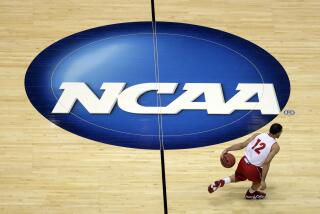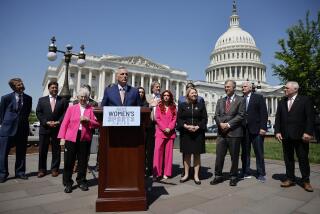Commentary : Barrel of Beer Ads Add Up to Big Bucks
- Share via
Dick Schultz, the executive director of the NCAA, politely calls it “mixed messages.” Not so charitably, I would call it “hypocrisy” when drug-education spots during NCAA telecasts are followed by beer commercials.
Schultz has emerged as a central figure in raising consciousness about college sports’ identification with beer huckstering and its effects on youth.
He said: “High school federations and others say that there are three million to four million alcoholics under drinking age in this country, that the No. 1 problem on campuses and in high schools is alcohol abuse. We have to be concerned.”
When Schultz first broached this issue of “mixed messages,” he seemed to suggest completely eliminating beer commercials from NCAA telecasts. This was met with opposition not only by the networks and beer companies, but also by school officials.
“The beer companies got upset that beer was called an illegal drug,” Schultz said. “But beer is illegal for those under drinking age, which takes in most college students.”
The networks are concerned about any threat to sponsorship dollars. But they have been shrewd enough not to raise a big public stink about Schultz’ threat. They merely pointed out a number of facts of life. If Schultz’ desire to drop beer commercials from NCAA tournament programming meant less revenue for telecasters, it would also mean a smaller rights fee for the NCAA, which will negotiate its next TV contract in the fall.
The realistic fact is, though, that the NCAA basketball tournament is such a hot property on television that other well-heeled companies would no doubt rush in to fill commercial gaps created by the absence of the beer barons.
The significant objection has been raised by NCAA member schools. Arizona Athletic Director Cedric Dempsey, chairman of the Division I men’s basketball committee, has said a number of athletic directors are opposed to a beer-ad ban by the NCAA because it would pressure individual schools to follow suit, wiping out beer commercials on regular-season telecasts. It would also raise the question of schools taking beer-signage money, beer ads in publications and beer sponsorships from coach’s TV shows.
Schultz sees the beer issue as a question of the hypocritical factor vs. the schools’ fear that the ban would trickle down revenue they believe they can’t afford to lose. He appears to recognize the trickle-down factor as a formidable obstacle to a beer ban, because he is talking about something less drastic than an outright beer ban.
The current NCAA Tournament deal with CBS limits beer advertising to 90 seconds per hour. If beer ads are to continue, Schultz said, “I would hope that at a minimum, we could limit those announcements to moderation or education-type messages about responsible drinking. The industry tells me they spend millions on such moderate-drinking messages, and I think that would be more apt on our telecasts.”
The beer industry has suggested that the proposal may be an infringement of free speech. Isn’t that a joke? With the Niagara of beer advertising all over the tube, just how much of a gag on beer huckstering would an NCAA ban represent?
Schultz heads an executive negotiating committee that includes two people from Divison I basketball. They will set the guidelines about beer commercials in negotiating the next NCAA Tournament rights, not only with CBS, but with NBC and ABC, which are also lusting for the NCAA jamboree.
The issue now comes down to the pressure put on the NCAA by citizens concerned about drugs -- which includes alcohol, which includes beer -- against the inside pressure by big schools that don’t want to lose beer-ad revenue.
Schools will lobby quietly and with force inside the NCAA. Citizen groups concerned with the alcohol problem on and off campuses and with impressionable pre-high schoolers assaulted by beer commercials will have to lay siege to the NCAA publicly.
More to Read
Go beyond the scoreboard
Get the latest on L.A.'s teams in the daily Sports Report newsletter.
You may occasionally receive promotional content from the Los Angeles Times.










